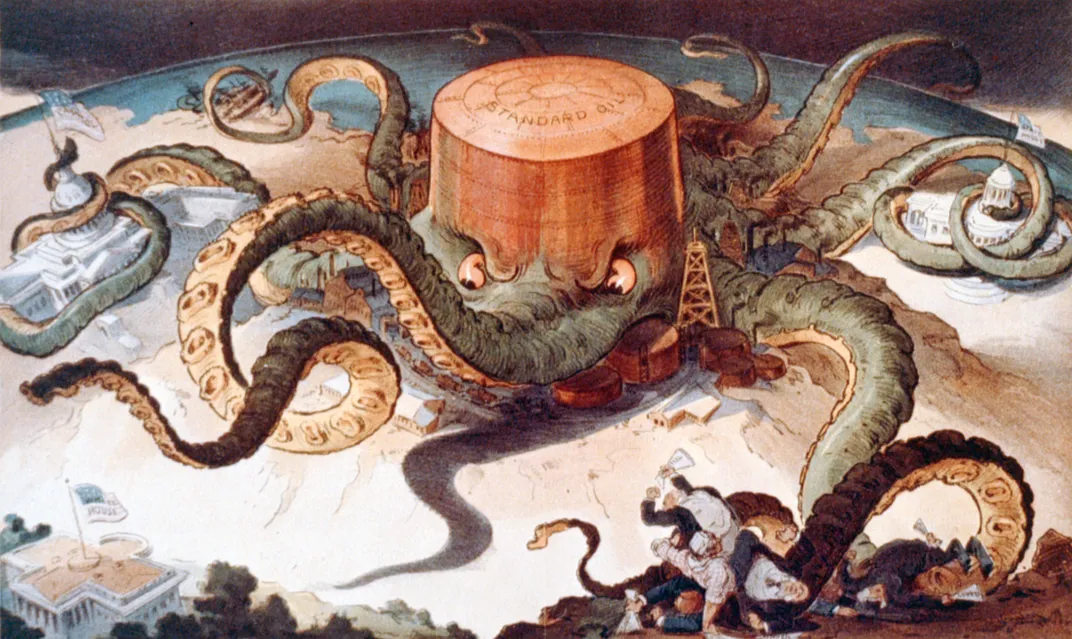John D. Rockefeller Was the Richest Person To Ever Live. Period
Standard Oil, his company, is one of the biggest reasons we have anti-monopoly laws
/https://tf-cmsv2-smithsonianmag-media.s3.amazonaws.com/filer/88/4f/884f1905-ffa7-48a4-9b47-8f9fe9832eaa/john-d-rockefeller-by-oscar-white-c1900_14751567818.jpg)
The story of John D. Rockefeller is maybe one of the strangest of the American Gilded Age. He loved to work, made an absurd fortune and then gave the bulk of it away.
On this day in 1870, Rockefeller incorporated the company that would make him almost inconceivably rich and, in many ways, begin the modern age of oil. Its tactics were brutal and he was himself ruthless, but he also gave an immense amount to charity.
People hated Rockefeller’s guts, but they also acknowledged that he was good at what he did. Even Ida Tarbell, the pioneering muckraker, had to tip her hat in the otherwise-brutal history of Standard Oil that she published in 1904: “There is nothing which concerned the oil business which John Rockefeller was not on the inside of,” she wrote.
Rockefeller's influence on the oil business even is visible today. “Although Standard Oil was eventually forced to break into multiple companies because it was ruled a monopoly, BP, Exxon, ConocoPhillips and Chevron (among others) are all subsidiaries of Standard Oil,” writes Sam Parr for The Hustle.
The man who headed that powerful concern was pretty weird, as genius often is. “Until he died, Rockefeller celebrated ‘job day’ every September 26 to commemorate his entry into the business world,” Parr writes. Later in life, he writes, Rockefeller said, “I often tremble when I ask myself the question: ‘What if I had not got the job?’”
"I believe it is every man's religious duty to get all he can honestly and to give all he can," he is often quoted as saying. But his critics—of which there were many—probably would have said that he was stretching the definition of honest.
Rockefeller pioneered the monopoly, Parr writes, aggressively buying smaller companies to grow his own—”a move that pioneered modern American capitalism.” His secret deals with the railroads enabled him to ship cheaply, Parr writes. By the early 1900s, Standard Oil controlled more than 90 percent of the market. “Competition is a sin,” Rockefeller once said, and he had certainly done his part to stamp that sin out.
His business was described as an octopus, a grasping monster:

In fact, Ida Tarbell's father and a business partner had been among Rockefeller's competition, until Rockefeller brutally took them over, writes Gilbert King for Smithsonian.com. After the takeover, the partner committed suicide and he was ruined, leaving a deep impression on a young Ida Tarbell.
In her exposé, which helped break up Standard Oil's monopoly, Tarbell held nothing back. In 1903, while working on her expose, she watched him in church. "It is pitiful, so pitiful, that one cannot watch John Rockefeller sit through a church service and never cease to feel that he is one of the saddest objects in the world," she wrote.
By this point in his life, Rockefeller was suffering from alopecia and was entirely hairless, including eyebrows. "She devoted significant thought to Rockefeller's stark physical appearance, wondering if it might somehow be viewed as a punishment for his misdeeds," Parr explained.
"Not knowing him, the writer's immediate thought was 'This is the oldest man in the world—a living mummy,'" she wrote.
But there was another side to him. “Rockefeller’s fortune peaked in 1912 at almost $900,000,000, but his estate totaled only $26,410,837 when he died,” Parr writes, “making him the biggest philanthropist ever to live.”
In a 1937 obituary, he is described as the “founder of one of the world’s most colossal private fortunes and benefactor of humanity.” He was 98 when he died, and according to his obituary, had “a peaceful, painless death.”